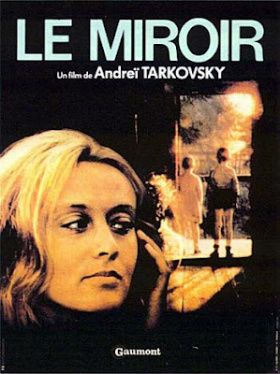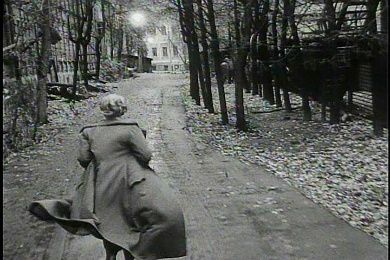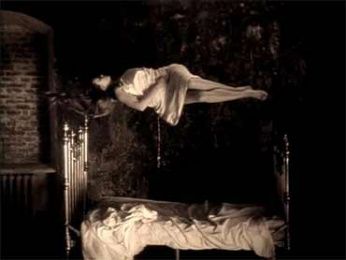
Zerkalo (The Mirror)
1974
Director: Andrey Tarkovsky
Starring: Margarita Terekhova, Ignat Daniltsev
Not for the faint of heart, Tarkovsky is undoubtedly among the greats of cinema. His work transcends traditional film narrative, and it is unlikely that there is a better example of this than in his The Mirror. Called by many a “film poem,” this is a rather apt description of a film that should never be spoken in the same breath as Hot Tub Time Machine.
IMDB informs me that the plot, nominal as it is, is about a 40 year old man who is about to die, reflecting on the memories and regrets of his life. The memories and regrets part I got; I did not realize while watching it that the man was about to die. Ah well; doesn’t really matter. What does matter is the sense of nostalgia and wistfulness that flows throughout the film. The film is composed of episodes, essentially, that are only linked by being different parts of the man’s life. There are stories of his young childhood in a cabin in the woods, of some of his military training when he was 12, of arguments with his mother when he is a man, of arguments with his ex-wife, and reminiscences of what his mother was like when she was young. What is interesting about all of these episodes is that none of them are what we would categorize as “life-changing.” He does not remember the day his son was born. He does not remember his wedding day. Rather, he remembers a party he had where a Spanish man re-enacted a great bull fight. He remembers the day that his mother, a young woman, panicked that she had mistakenly allowed a misprint to be printed in the evening newspaper. He remembers his father, mostly absent, helping his mother wash her hair in a basin. These are the episodes that speckle The Mirror; these tiny, seemingly insignificant moments that make life what it is. We have few “big days” in life; it is as if Tarkovsky is saying that the “regular days” are just as memorable, if not more so. They deserve to be preserved and remembered too.

The cinematography is breathtakingly spectacular. Watching the wind sweep across the forest-rimmed meadow is quietly thrilling. Tarkovsky moves effortlessly between slow motion and normal pacing, black and white and color, and different time periods. A barn burns, and no one panics. There is simple resignation as the barn burns, and the camera languidly watches as well, taking in the dance of the flames. Watching his mother run down a long corridor in black and white, her coat billowing behind her, as her shoes sound purposely on the linoleum beneath her, is hypnotic. There is a sense of sadness in the film, as befits the mood of reminiscence.

In addition to the beauty of the film, this is a fantastic remembrance of Russia (then the USSR). Tarkovsky shows a very personal Russia. This is not the standard Communist state we in the West are used to seeing. There is no dreary, hard winter; there is only one sequence that takes place during winter, and that is relatively short. Rather, we see lovely spring and summer, lush and verdant, full of rain and growth to the extent where you can almost smell the damp soil. We see an apartment, a lovely apartment, in a city that could just as easily pass for New York as Moscow. This is not Hollywood’s Russia; this is most definitely Tarkovsky’s Russia.

Would I recommend The Mirror? Yes, with reservation. It is hands down one of the most moving, beautiful films ever made, but if you are the type of filmgoer who needs a story, then please move away. There is very little story, and it is not the point of the film anyway. It is a quiet, contemplative, almost sad little movie, full of beauty and silence, content to simply let the camera paint the scene. I was fortunate enough to see this (for the second time) in a movie theater, and that is the way to watch it. Away from distractions, away from “the real world.” It is wasted on home viewing. The quiet contemplation of the theater is perfect for gaining admission into Tarkovsky’s melancholic memoir.
Arbitrary Rating: 8.5/10. Beautiful but rather impermeable.
adidas nmd uk
ReplyDeleteskechers shoes
air jordan retro
ralph lauren online
yeezy shoes
michael kors uk
ralph lauren online,cheap ralph lauren
adidas tubular runner
adidas tubular sale
hermes belt for sale